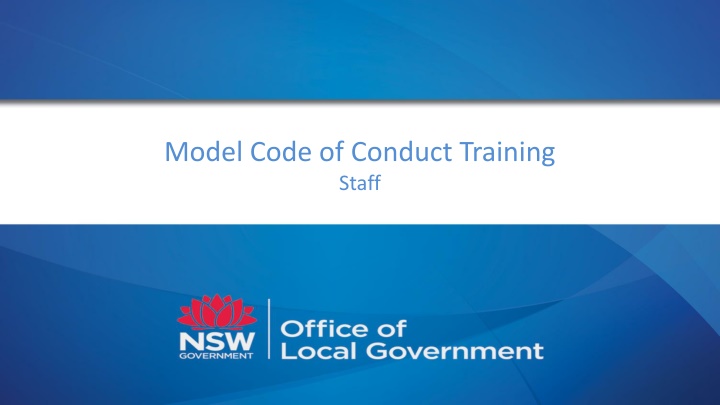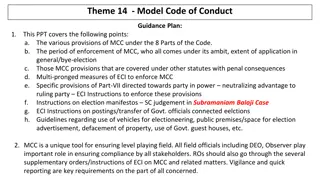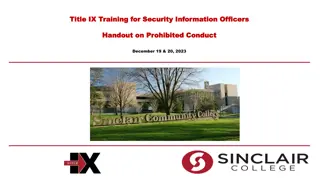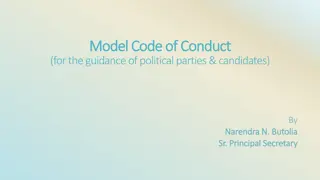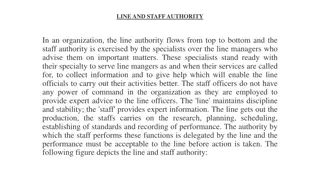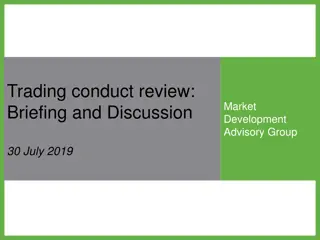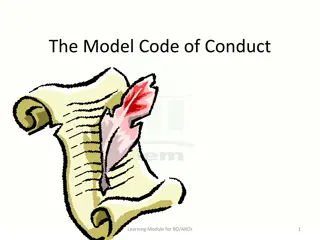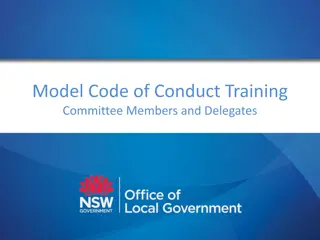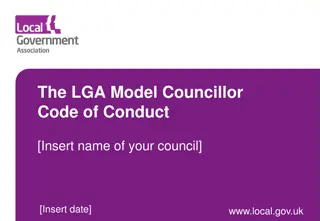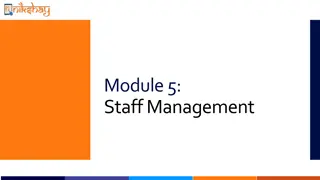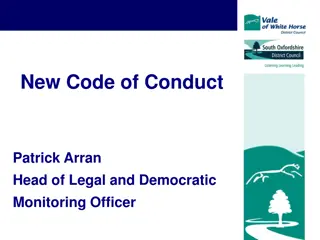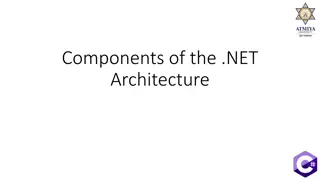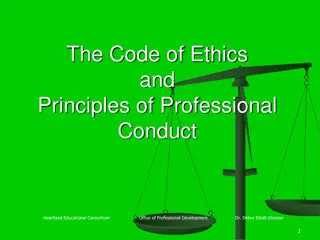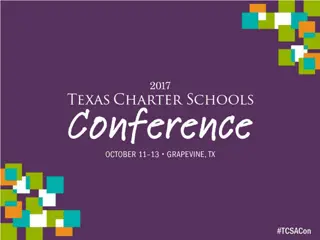Model Code of Conduct Training Staff Overview
This training material covers various aspects of the code of conduct for council officials, including general conduct requirements, conflicts of interest, gifts and benefits policies, interactions with councillors, use of council resources, and procedures for submitting returns of interest. The code emphasizes acting lawfully, ethically, and with diligence to maintain public trust in the council.
Download Presentation

Please find below an Image/Link to download the presentation.
The content on the website is provided AS IS for your information and personal use only. It may not be sold, licensed, or shared on other websites without obtaining consent from the author.If you encounter any issues during the download, it is possible that the publisher has removed the file from their server.
You are allowed to download the files provided on this website for personal or commercial use, subject to the condition that they are used lawfully. All files are the property of their respective owners.
The content on the website is provided AS IS for your information and personal use only. It may not be sold, licensed, or shared on other websites without obtaining consent from the author.
E N D
Presentation Transcript
OVERVIEW General conduct Submitting returns of interest Conflicts of interest Gifts and benefits Interactions with councillors Use of council information and resources Code of conduct complaints
What is the code of conduct? A council s code of conduct sets the minimum standards of conduct for all council officials. Every council and joint organisation must adopt a code of conduct that incorporates the provisions of the Model Code of Conduct. It is important that the local community has confidence in the council and you.
General Conduct you must You must: act lawfully and honestly and exercise care and diligence give your attention to council business when on duty undertake your work ethically, efficiently, economically and effectively carry out reasonable and lawful directions even if you don t agree with them consider matters consistently, promptly, fairly and in accordance with procedures ensure regulatory decisions are properly made and that all parties are dealt with fairly take care of your own and others health and safety ensure any political activities you take part in do not to conflict with your responsibilities as a council staff member.
General Conduct you must not You must not conduct yourself in a way that: will bring the council into disrepute is contrary to law and council policies is improper, unethical or an abuse of power involves misuse of your position for personal benefit constitutes harassment or bullying or is unlawfully discriminatory, or is intimidating or verbally abusive.
Returns of Interests disclosures by staff Staff who exercise functions that may give rise to conflicts of interest (ie designated persons ) are required to disclose their personal interests in publicly available returns of interests. Staff who are designated persons must complete and submit returns of their interests to the general manager. A return of interest must be submitted: within 3 months of your appointment and then annually within 3 months of becoming aware of any new interest.
Returns of Interests What interests do I need to disclose? You are required to disclose: interests in real property gifts contributions to travel interests and positions in corporations positions in trade unions and professional or business associations dispositions of real property sources of income debts
Conflicts of Interest There are two types of conflicts of interest: pecuniary and non-pecuniary. Your obligations to disclose and manage conflicts of interest will depend on what type of conflict of interest you have.
Conflicts of Interest What is a pecuniary interest? You will have a pecuniary interest in a matter you are dealing with where there is a reasonable likelihood or expectation that you or a related person will gain or lose financially as a result of any decision made in relation to that matter.
Conflicts of Interest managing pecuniary interests Where you have a pecuniary interest in a matter you are dealing with, you must disclose it as soon as you become aware of it in writing to your manager or to the general manager if you are a designated person. The general manager or your manager will decide how the matter will be dealt with. If you are a member of a committee, you must disclose any pecuniary interest you have in any matter being dealt with by the committee at each committee meeting that the matter arises and leave the meeting while it is being considered and voted on.
Conflicts of Interest What is a non-pecuniary conflict of interest? Non-pecuniary interests are private or personal interests that are not pecuniary interests. You will have a non-pecuniary conflict of interest in a matter you are dealing with if a reasonable and informed person would perceive that you could be influenced by a private interest that you have in that matter. How you deal with a non-pecuniary conflict of interest will depend on whether it is significant.
Conflicts of Interest significant non-pecuniary conflicts of interest You will have a significant non-pecuniary conflict of interest in a matter where you have: a close relationship (including a business relationship) with a person who will be affected by a decision a strong affiliation with an organisation that will be affected by a decision a financial interest in the matter that is not a pecuniary interest, or you otherwise stand to gain or lose a personal benefit as a result of a decision
Conflicts of Interest conflicts of duties Significant non-pecuniary conflicts of interest also occur where you are member of the board or management committee of an organisation, as the council s representative, and the interests of the council and the organisation are potentially in conflict in relation to the matter under consideration. This is what is known as a conflict of duties .
Conflicts of Interest managing significant non-pecuniary conflicts of interest Disclose it in writing to your manager as soon as possible, disclose it on each occasion the matter arises, and do not participate in any consideration of the matter. If you are a member of a council committee you must also disclose your interest at each committee meeting that the matter arises and leave the meeting while the matter is being considered and voted on.
Conflicts of Interest managing non-pecuniary conflicts of interest that are not significant A non-pecuniary conflict of interest will not be significant where it arises from a relationship or affiliation that is not particularly close or strong. You must still disclose your interest in writing to your manager as soon as possible and explain why you believe it is not significant. Your manager will help you decide how to manage your interest. If you are a member of a committee, you must also disclose your interest at each committee meeting the matter arises and explain why you believe it is not significant and no further action is necessary to manage it.
Conflicts of Interest What if I am not sure? The onus is on you to identify and disclose any potential conflict of interest you may have in a matter you are dealing with and to manage it appropriately. If you are not sure always err on the side of caution declare, then discuss with your manager.
Conflicts of Interest secondary employment You cannot undertake any paid work outside of council that relates to council business or that may conflict with your council duties without the approval of the general manager.
Conflicts of Interest dealing with council as a resident You should deal with the council in the same way as other members of the public. You should not expect or seek any preferential treatment. You must not use your position to obtain a private benefit for yourself or for someone else or to influence others to obtain a private benefit for yourself or for someone else.
Gifts and Benefits A gift or benefit is something offered to or received by you, or someone closely associated with you, for personal use or enjoyment. Key principles: You must not benefit personally from your work other than through the remuneration and any other benefits you receive as an employee You must not be influenced or be seen to be influenced as a result of the receipt of a gift or personal benefit.
Gifts and Benefits What is not a gift or benefit? Gifts and benefits do not include: items with a value of $10 or less a gift or benefit provided to the council as part of a cultural exchange or sister city relationship a benefit provided to you by the council attendance at a work-related event for the purpose of undertaking your council duties meals, beverages or refreshments provided to you while you are carrying out your council duties.
Gifts and Benefits you must not You must not: seek or accept bribes seek gifts or benefits of any kind accept any gift or benefit that may create a sense of obligation, or that may be perceived as intended or likely to influence you accept any gift or benefit that is worth more than $100 accept tickets to major sporting or cultural events with a ticket value of over $100 or corporate hospitality at such events accept cash or cash-like gifts of any amount participate in competitions for prizes where eligibility is based on the council being a customer of the competition organiser personally benefit from reward points programs when purchasing on behalf of council.
Gifts and Benefits What if you can t refuse? If you are offered a gift or benefit that is worth more than $100 that cannot be reasonably refused, you must surrender it to the council.
Gifts and Benefits What you can accept? You can accept gifts valued under $100. But, if the same person, or someone associated with them, offers you another gift in the next 12 months, which, if added to the value of the first gift, has a value that exceeds $100, you must refuse to accept the additional gift. You must promptly disclose any gift of any value to the general manager in writing for entry into council s gift register.
Interactions with Councillors The general manager is responsible for the management of council staff. The mayor and councillors cannot direct staff in the performance of their duties. Most contact is likely to occur through the general manager or other senior staff approved by the general manager. Any interaction must be with the general manager s approval or comply with council s councillor/staff interaction policy.
Interactions with Councillors councillors obligations Councillors must not: behave in an overbearing or threatening way towards staff direct, pressure or influence staff in the performance of their duties, including in relation to the making of recommendations, or make personal attacks on staff at council meetings or other public forums including social media.
Interactions with Councillors your obligations You mustnot: discuss personal workplace matters with councillors such as operational issues, grievances, workplace investigations or disciplinary matters provide ad hoc advice to councillors without recording or documenting the interaction in the same way you would a member of the public. You must: treat councillors with respect and not behave in an overbearing or threatening way.
Interactions with Councillors What information are councillors entitled to? The mayor and councillors are entitled to any information necessary to perform their functions effectively as members of the governing body and as elected representatives. Councillors are not entitled to information on matters they have a conflict of interest in. If councillors have a private interest only in council information, they have the same rights of access to that information as any other member of the public.
Use of Council Resources Council resources are public resources. You must use council resources ethically, effectively, efficiently and carefully when performing your duties. You must not use council resources for private purposes, or convert council property for your own use unless you are authorised to do so.
Use of Council Resources What records should be kept? All information created, sent or received in your official capacity and any information stored on council resources is considered to be a council record and must be kept in accordance with the State Records Act 1998and the council s records management policy. Do not destroy, alter or dispose of records unless authorised to do so.
Use of Council Resources using council information You can only access and use council information for council business. You must not use council information for private purposes. You must not seek to privately benefit from any council information you have obtained in your role as a staff member. You must only release council information in accordance with council policies and procedures and in compliance with relevant legislation.
Use of Council Resources protecting confidential information You must maintain the integrity and security of any confidential or personal information you have access to. In particular, you must: only access confidential or personal information that you have been authorised to access and only for the purposes of performing your functions protect confidential and personal information only use confidential or personal information for the purpose for which it is intended to be used only release confidential or personal information if authorised
Use of Council Resources protecting confidential information You must not: use confidential or personal information to obtain a private benefit for you or for someone else use confidential or personal information to cause harm to the council or anyone else disclose confidential information discussed during a closed session of a council or committee meeting or any other confidential forum.
Use of Council Resources using council devices You must not use council s computer or mobile devices to access, download or communicate any material that is: offensive obscene pornographic threatening abusive or defamatory could lead to civil or criminal liability and/or damage council s reputation.
Code of Conduct Complaints The council s code of conduct is the key mechanism for promoting and enforcing ethical and behavioural standards. It is important that the council s code of conduct is correctly used and that code of conduct processes are respected and complied with.
Code of Conduct Complaints How are code of conduct complaints made? To be dealt with under the code of conduct, complaints must: be made in writing to the general manager, or if about the general manager, to the mayor be made within 3 months show conduct that would constitute a breach of the council s code of conduct if proven
Code of Conduct Complaints What is not a code of conduct complaint? Complaints about the following are not code of conduct complaints and should not be dealt with under the council s code of conduct: the standard or level of service provided by the council the merits of a decision policies or procedures of the council conduct in good faith, that would not otherwise constitute a breach of the council s code of conduct.
Code of Conduct Complaints How are complaints about staff dealt with? The general manager is responsible for dealing with code of conduct complaints about council staff. Complaints must be managed in accordance with the relevant industrial instrument or employment contract and make provision for procedural fairness including the right of staff to be represented by their union. Where proven, code of conduct complaints may result in counselling, training or disciplinary action including dismissal.
Code of Conduct Complaints your obligations You must not: make code of conduct complaints for an improper purpose take reprisal action for making or dealing with a code of conduct complaint disclose any information about a code of conduct complaint impede or disrupt the consideration of a code of conduct complaint and comply with any reasonable and lawful requests
